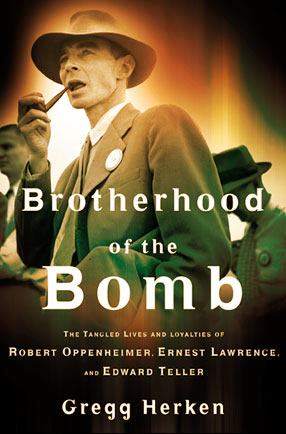 Cover Art Raquel Jaramillo Content Copyright Gregg Herken 2023 Contact the author: gherken@brotherhoodofthebomb.com Please e-mail the author for questions or comments about the functionality of this site. |
||
Brotherhood of the Bomb: The Tangled Lives and Loyalties of Robert Oppenheimer, Ernest Lawrence, and Edward Teller (Henry Holt and Co. 2002) 
|
||
|
[ NEW EVIDENCE: Website updated 2023 ] The 2023 Christopher Nolan film, "Oppenheimer," has revived popular interest in the complex and enigmatic physicist who led the scientific effort to build the first atomic bomb. The decision, in late 2022, by the U.S Department of Energy to "vacate" the 1954 decision that had stripped Oppenheimer of his security clearance was a partial vindication of the scientist, and the belated redress of a wrong brought about by Cold War hysteria. One of the enduring questions about "Oppie" that persists, concerns his relationship to the American Communist Party prior to his involvement with the bomb project. Haakon Chevalier, Oppenheimer's close friend, claimed that he and Robert had belonged to a "closed unit" of the Communist Party's professional section in Berkeley, from 1937 to early 1942. Membership in the unit remained a secret, to protect the reputations "as well as the jobs" of those doctors, lawyers, and college professors who had joined. The "closed unit," Chevalier explained, was not an espionage "cell," but, rather, a politically-minded group that met bi-monthly to discuss international affairs, and to receive occasional briefings from Party officials on the latest changes in communist dogma. Oppenheimer, for his part, repeatedly denied belonging to any element of the Communist Party, "concealed or open." On at least one occasion, his denial was under oath. When I wrote Brotherhood of the Bomb, I felt that there was too little evidence to judge whether Chevalier or Oppenheimer was telling the truth. Accordingly, I treated the question a bit like Rashomon it was a matter of perspective: "Oppenheimer would later characterize the group as an innocent and rather na�ve political coffee klatch. To Chevalier, however, it was something much more: "a "closed unit" of the Communist Party" -in effect, a secret Communist "cell" whose members, part of the CP's so-called professional section, were discouraged from holding open membership in the party." Evidence that subsequently came to light, however, following the publication of my book, prompted me to conclude that Chevalier was telling the truth, and Oppenheimer had lied. Some of that evidence may be found in the "Documents" section on this website. A more detailed account will be in my forthcoming article, "A Tale Half-Told: Christopher Nolan's 'Oppenheimer'" for the Journal of Cold War Studies. Before going further, I would like to clarify who I believe Robert Oppenheimer was, and who he was not. While I believe the evidence is now compelling that Oppenheimer was a "closet communist" -a member of the secret Party unit that Chevalier had identified- "Oppie" was also, and remained always, a loyal American. Contrary to accusations made by a former Soviet intelligence officer in the 1990s, Oppenheimer was not an "agent of influence," or spy, and never revealed atomic secrets to the USSR. The evidence for this conclusion comes, ironically, from Soviet intelligence sources themselves: KGB documents that surfaced following the political collapse of the USSR in late 1991. For the details, see my article, "Target Enormoz: Soviet Nuclear Espionage on the West Coast of the United States, 1942-1950," in the Journal of Cold War Studies, Vol. 11, Number 3, Summer 2009, pp. 68-90. The real importance of Oppenheimer's lying about his membership in the closed Party unit before the war is that gave him something he had to hide for the rest of his life; indeed, it was a secret he took to the grave. This secret may also help to explain why, unlike Andrei Sakharov -the Russian atomic physicist with whom "Oppie" is often compared- Oppenheimer never actively participated in the nuclear arms race debate following his 1954 security hearing. Whereas Sakharov continued to speak out against nuclear weapons, even after he was forced into internal exile in Russia, Oppenheimer, by contrast, remained curiously silent regarding a topic he obviously felt passionate about, and where he had originally played a leading role. Gordon Griffiths, who served as the liaison between the rank-and-file Communist Party and Berkeley's closed unit of professionals, from fall 1940 to spring 1942, anticipated in an unpublished memoir the objections that would be raised when he revealed that Oppenheimer had belonged to the secret Party unit. Griffiths, who died in early 2001, had been a graduate student at Berkeley before the war, and later became a distinguished professor of history at the University of Washington. In 1999, he wrote in the memoir that was intended to be a kind of apologia pro vita sua: "[Oppenheimer's] defenders have always stoutly denied that he was ever actually a member of the Communist Party, and have sought to explain away his association with leftist causes with the assertion that he was politically na�ve. A great deal of energy was spent by well-intentioned liberals who felt that this was the only way to defend his case. Perhaps at the time- at the height of the McCarthyite period- it was... But the time has come to set the record straight, and to put the question as it should have been put: not whether he had or had not been a member of the Communist Party, but whether such membership should, in itself, constitute an impediment to his service in a position of trust." We now know that Robert Oppenheimer was a phenomenon that FBI Director J. Edgar Hoover had always argued was a logical impossibility: an American communist who was also a loyal American patriot. Portions of Griffiths’ manuscript, "Venturing Outside the Ivory Tower: The Political Autobiography of a College Professor," are in the “Documents” section of this website. |